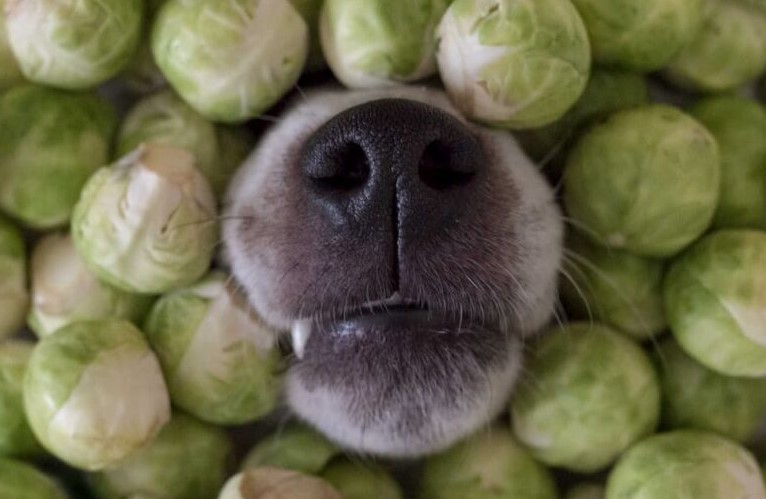Can dogs eat Brussels sprouts? Yes they can! This cruciferous vegetable is full of healthy fiber, fights free radicals and can increase your dog’s appetite. If you are unsure whether or not Brussels sprouts are safe for your dog to eat, read this article to learn more! And, once you have read this, you should feel confident that Brussels sprouts are safe for your dog to eat.
Brussels sprouts are low-calorie treats dogs will love. Dogs benefit from a calorie-dense diet. As long as they’re not eating too many high calorie treats, Brussels sprouts and other healthy vegetables can provide dogs with just the right amount of daily nutrition. We’ll discover everything you need to know about Brussels sprouts for dogs along with answering common questions on whether or not dogs can eat Brussels sprouts.

Brussel sprouts are a cruciferous vegetable
Like humans, dogs can eat Brussels sprouts. The cruciferous vegetable is low in carbohydrates and fat. It contains lots of fiber and important vitamins and minerals. They are also an excellent option for diabetic dogs. However, you should avoid giving your dog too many Brussels sprouts at a time. Whether your dog will eat the whole brussel sprout is a matter of individual preference.
They contain dietary fiber
Many benefits of eating Brussels sprouts for dogs have been documented, including reduced risk of chronic disease, improved digestion, and reduced begging for food. These vegetables are rich in antioxidants and contain phytonutrients that fight free radicals and protect the body from free radical damage. Antioxidants also aid in the regulation of bowel movements and cognitive functioning. The dietary fiber in Brussels sprouts also slows the digestive process and lowers the risk of constipation and diarrhea in dogs. Despite the health benefits of Brussels sprouts for dogs, there are some precautions that you should take before feeding these to your dog.
They fight free radicals
The antioxidants in Brussels sprouts help to boost a dog’s metabolism. They also support the nervous system and help the dog make new cells. Among the other benefits of Brussels sprouts are their anti-inflammatory properties and the benefits to cardiovascular health. Additionally, they are a good source of potassium and manganese, which are necessary for cellular functioning and fluid balance. Lastly, Brussels sprouts help prevent heart disease.
They increase your dog’s appetite
If you’re interested in increasing your dog’s appetite, brussels sprouts might be a good choice. Although they are high in fibre, Brussels sprouts are safe to give to your dog in small amounts. You can avoid the possibility of bowel upset by slicing them into smaller portions. However, if you’re preparing them for your dog, you should keep in mind that they might cause flatulence and diarrhea.
They are a good source of Vitamin C
Interestingly enough, your dog can enjoy Brussels sprouts as a treat and a healthy addition to your dog’s diet. These vegetables are rich in Vitamin C and phytonutrients, which push food through your dog’s digestive system. These compounds help to build the muscles in the intestines that push food through your dog’s gastrointestinal tract. They also contribute to the
growth of excess bacteria in the intestinal tract, which helps with digestion and fermentation. When your dog eats too much Brussels sprouts, excess bacteria is released by the body as gas, and you may have to clean up the mess!
They are a good source of manganese
Besides being a great source of manganese, Brussels sprouts are also good for your dog’s health. Potassium protects your dog’s body’s general health. Manganese supports the immune system and keeps your dog’s bones healthy. Adding Brussels sprouts to your dog’s diet can help boost his overall health, but be sure to serve them in moderation and properly cooked.
They are a good source of isothiocyanate
This phytonutrient helps push food through the digestive tract. It also helps to build excess bacteria that aid in the fermentation process of digestion, which results in gas. Consuming too much of Brussels sprouts can lead to gas, so make sure to serve your dog in moderation. But don’t worry: the amount of gas in your dog’s stomach is not harmful!

They are not toxic to dogs
Despite the appearance of their toxic nature, brussel sprouts are actually beneficial to your dog. Unlike carrots, which are toxic to dogs, brussel sprouts are not harmful to canines at all. They are high in fiber and contain essential vitamins and minerals. Among these vitamins and minerals are Vitamin A and Vitamin C, which are important for your dog’s normal vision, proper heart and lung function, and healthy skin and coat. Vitamin E is also a good source of antioxidants, which protect the cells from damage caused by free radicals.
Dogs aren’t known for being picky eaters . . . __but can dogs eat Brussels sprouts? __Well, yes, as long as they’re being served plain and fresh, which is typically what you’ll find in grocery stores. However, Brussels sprouts are harmful when cooked incorrectly or if they have been given seasonings. Bacteria will start to grow rapidly if the Brussels sprouts have been cooked for too long or if seasoning has been added to them. The end result could land your dog, and even you, in the hospital with severe food poisoning. So be sure to read up on more dog-safe foods before giving Brussels sprouts to your dog.








